Aloha to the US: Is Hawai'i an occupied nation?
- Published
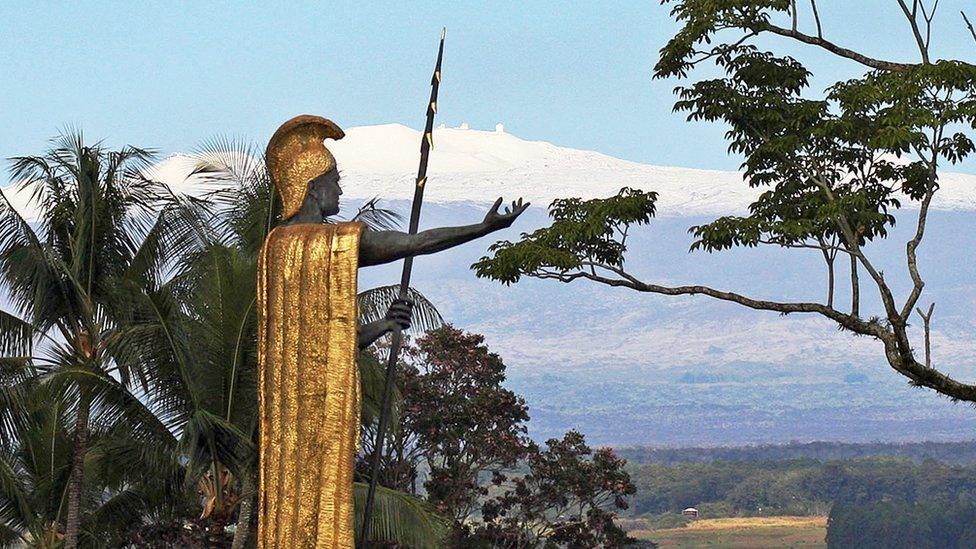
Hawai'i's King Kamehameha I with snow-capped Mauna Kea in the distance
An upcoming election has highlighted the deep disagreement between native Hawaiians over what the future should look like. For some, it's formal recognition of their community and a changed relationship within the US. Others want to leave the US entirely - or more accurately, want the US to leave Hawai'i.
When US officials came onto the stage that June night, they must have known they would be hearing from a hostile audience.
Speaker after speaker came up to the microphone, decrying a rigged process and an occupying government with no legitimacy.
"We do not need you here. This is our country."
"Get out of our house! Go home."
The officials weren't hearing from foreign nationals, but a crowd of citizens in Honolulu, Hawai'i. Someone began singing the opening words to Hawaii Ponoʻī - a national anthem of the Hawaiian Kingdom and the state's official song.
"Hawaii ponoʻī (Hawaii's own), Nānā i kou moʻī (Be loyal to your king)."
Many in the room at the Hawaiian state capitol began singing along.
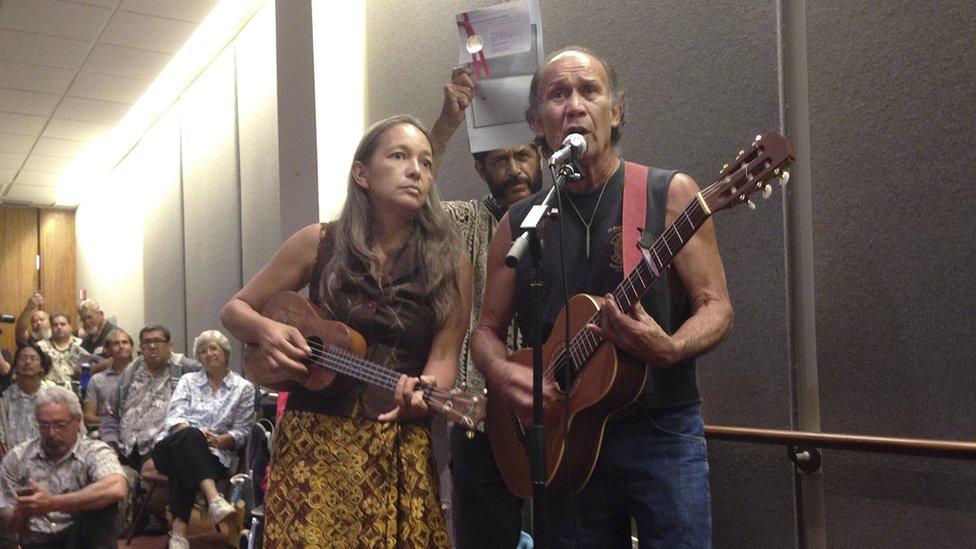
Laulani Teale, left, and Liko Martin, right, sing while Palani Vaughan, centre rear, holds up a copy of Queen Liliuokalani's protest of the overthrow of Hawaii during a Honolulu interior hearing
This was the first in a series of 2014 hearings by the US interior department about whether it should offer a path to federal recognition to the Native Hawaiian community. Such a path has been long open to Native American groups on the mainland, but not to the descendants of Hawaii's indigenous people.
A year later, the interior department has made it official - publishing a proposed "procedures for re-establishing a formal government-to-government relationship".
The first ballots to elect delegates to a convention, or 'aha, for this purpose have now gone out in Hawai'i. Forty delegates from across the islands will meet in February to discuss whether there should be a Native Hawaiian government and what it should look like in the 21st Century.
But not everyone is happy with the 'aha. Some of those who would be eligible to vote, or become delegates themselves, have said they will boycott it. One delegate candidate has already dropped out, calling the 'aha "not pono" (upright or fair).
Federal recognition has been a wish of some activists for decades, but previous attempts to do so in Congress have failed. A prominent Hawaiian in Washington, however, has moved the process forward.
Barack Obama publicly supported the last attempt to gain the recognition option through Congress. Like other issues that have been stymied in the polarised legislature, the administration has now decided to take action through the executive branch.
But for those who see Obama as their best chance, time is running out - his term ends just over a year from now.
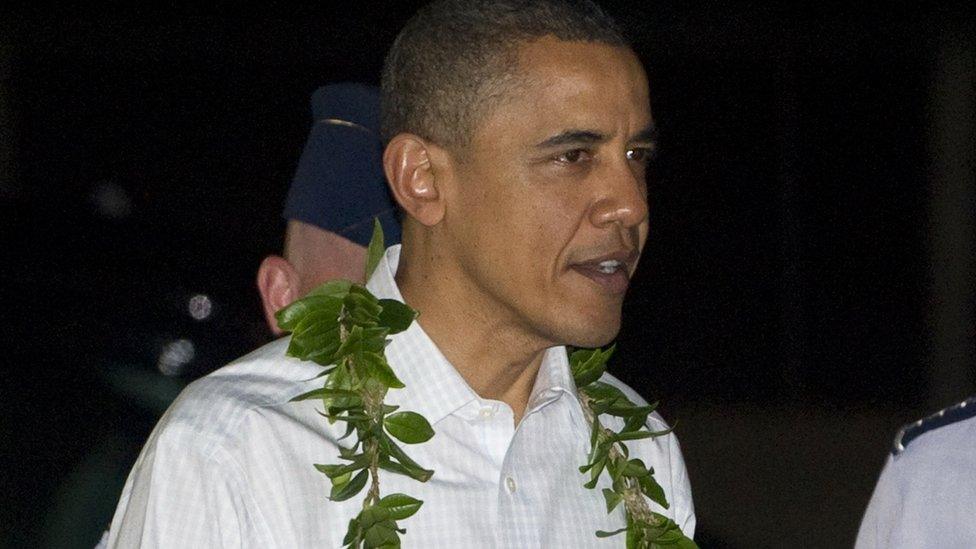
Barack Obama, born in Honolulu, returns to Hawaii every December with his family
Native American tribal governments are a nation within a nation. Such governments hold their own elections, run police departments, courts and other internal infrastructure on reservation land. American Indians are citizens of their tribe, the US and the state where they live.
But tribal nations are still "domestic dependent nations" and the boundaries of their sovereignty have moved based on court rulings and legislation.
Recognition would define native Hawaiians as a separate political entity - protecting many of the federal programmes currently provided to native Hawaiians, like favourable housing loans, a land trust programme, health care, educational and cultural grants.
It would also allow for an element of economic independence, although one industry that has enriched a few Native American tribes - gambling - is banned in Hawai'i.
But all of this is predicated on the idea the US government is the rightful authority in Hawai'i, something a small but increasing number of Hawaiians no longer believe.
Williamson Chang, a professor of law at University of Hawai'i, is one of those Hawaiians. He argues under international law, one country can only annex another by treaty - a document which both parties sign. This is how the entire rest of the US was formed - the Louisiana Purchase, the treaties with Native American tribes, the addition of the Republic of Texas. Anything else - including what happened in Hawaii - is an occupation, Chang says.
Hawaii occupies a unique place in US history - a set of islands 2,500 miles (4,023km) away from the mainland where in 1893, white businessmen and sympathetic politicians, with help from the US military, overthrew a constitutional monarchy.
The coup leaders hoped to be immediately annexed, but President Grover Cleveland rejected the idea, calling US involvement in the overthrow an "embarrassment".
Three years later, a treaty failed in the Senate after lobbying by the deposed Queen Liliuokalani as well as tens of thousands of petitions from Hawaiians opposing the move.
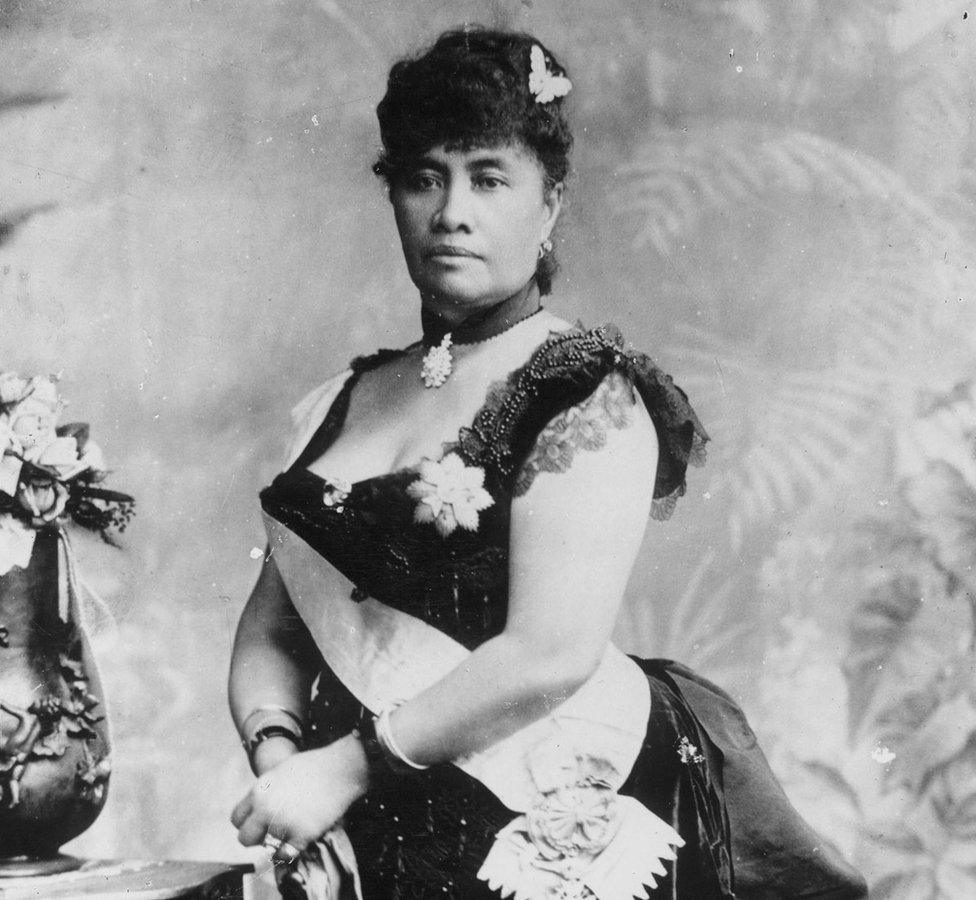
Queen Liliuokalani (seen here at Victoria's Golden Jubilee) led efforts to oppose Hawai'i's annexation to the US
But the next year, with fighting in the Pacific during the Spanish-American war and a new president in office, Congress passed a joint resolution annexing Hawai'i. US military might and a welcoming government in the Republic of Hawaii helped complete the process.
But if countries could be simply annexed by another's legislature, Chang says, "Hawai'i by its legislature could declare the United States was part of it."
While the US has formally apologised for their role in the overthrow of the Kingdom - a 1993 Congressional resolution admitted as much - there's been no word from the US government about whether the annexation was legal.
"There are definitely flaws in the way in which Hawaii and its lands were transferred to the US," Melody Kapilialoha Mackenzie, a professor of law at the University of Hawaii, says.
"But for me, the question is - where do you take those claims - is there any forum in which that voice can be heard?"
In 2000, David Keanu Sai brought a case concerning Hawaiian sovereignty to the Permanent Court of Arbitration in the Netherlands. The court agreed to hear the case but ultimately made no ruling, saying it could not even consider the issue because "the United States of America is not a party to the proceedings and has not consented to them".
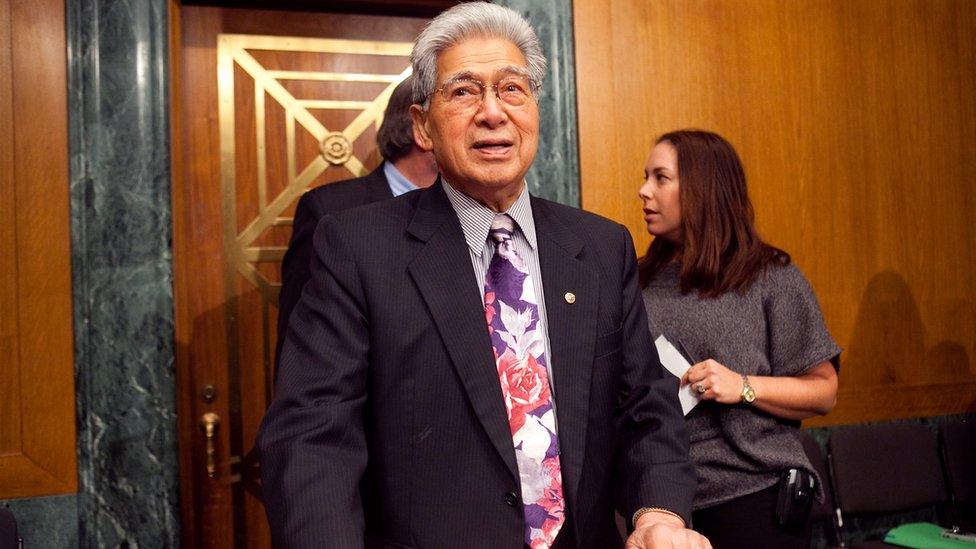
Former Hawaiian Senator Daniel Akaka tried for years to get federal recognition for native Hawaiians through Congress
Sai is also among those who believe that race or ancestry has no place in a Hawaiian bid to be free of the US. The Hawaiian Kingdom was a multi-ethnic government, and that's how it should remain, he says, something that wouldn't happen under federal recognition.

What everyone can agree on is the hurt done to Native Hawaiians.
Peter Apo says he spent almost half of his 75 years "not knowing who the hell I was".
"The only thing I knew about Hawaiians was what I saw in television and the tourism ads," he says. He's now one of the trustees of the Office of Hawaiian Affairs, a state agency.
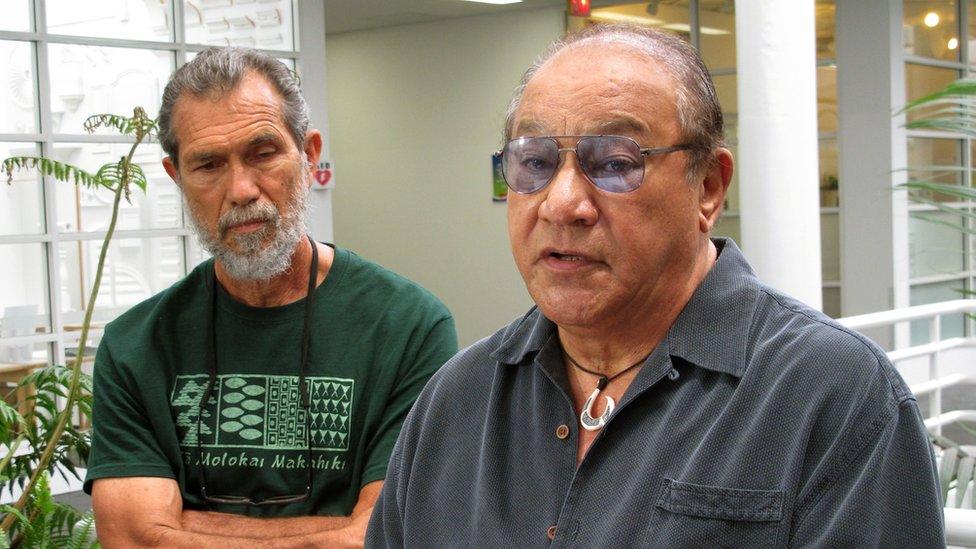
Walter Ritte (left) has withdrawn his candidacy to the 'aha, Peter Apo (right) supports federal recognition
By the time of the overthrow in 1893, the Hawaiian population had gone from at least 400,000 to less than 40,000 people - all in the space of a century, in part because of diseases introduced into the islands. After annexation, students were not allowed to speak Hawaiian in school, and the language almost died out as a result.
Kahoolawe, an island considered spiritually important to Hawaiians, was used as test-bombing site by the US army until the 1990s. Unexploded ordnance still remains on the island even after a clean-up attempt.
And today, many health indicators for Native Hawaiians, external are the worst of all the ethnic groups in Hawai'i.
"I think for many native Hawaiians… it's not like something that happened way in the past," Mackenzie says.
McGregor says the previous generation of Hawaiian activists struggled for the cultural and political gains Native Hawaiians have managed so far and younger Hawaiians take it for granted. She thinks federal recognition is needed.
"It was fought for and it can be lost," she says.
Joshua Lanakila Managuil, a young activist who is running for a seat on the 'aha, says he's lucky to be the product of a Native Hawaiian cultural and political renaissance, but he's worried about the ramifications of federal recognition. He points to the uneven and largely difficult situation of Native Americans.
"That is not a model for me that is going to secure our safety," he says. "We need to acknowledge what was done and remedy those things instead of slapping on a [plaster]."
Apo has written a number of editorials calling for a native Hawaiian government for the purposes of federal recognition.
He suggests such a government could "carve out a duty free port of call", and be able to do business with other nations. "That would be huge...that would be an opportunity that would benefit all Hawaiians," even non-native ones.
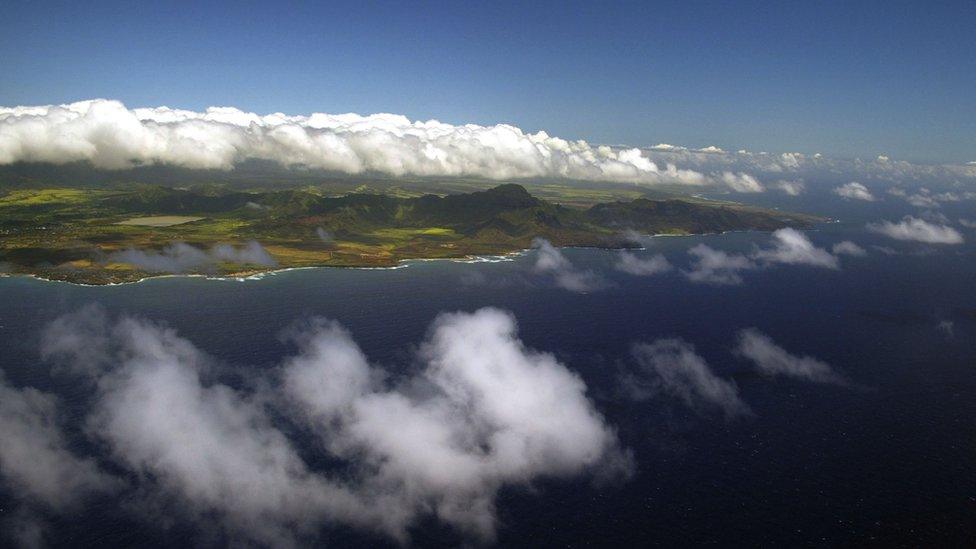
But Apo says he can see where the opposition is coming from.
"I guess part of the sentiment is why would you want to deal with the very people who did you in?"
While pro-independence Hawaiians dominated the microphones during interior department's hearings over the summer, the breakdown of the written comments was different.
Chang estimates about 60% of those comments were in favour of federal recognition, and he suspects that percentage translates to the larger Hawaiian population.
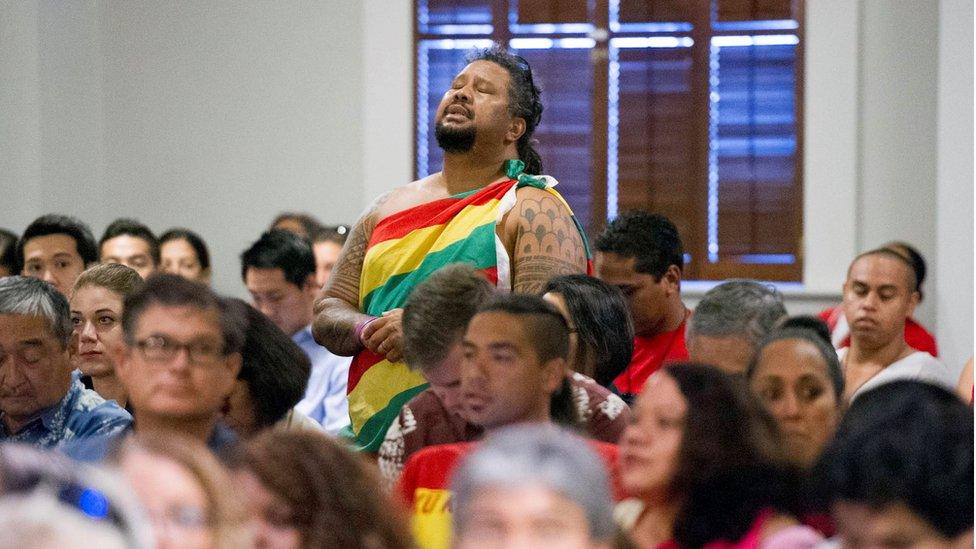
Hawaiians have seen a cultural renaissance since the 1970s - re-establishing cultural and religious practices and the Hawaiian language.
"I would say the majority of Hawaiians don't agree with sovereignty and independence - either they don't know their history or they think it's way too late to separate from the US," he says. "It's an uphill battle for the sovereignty groups."
And it is a battle that now has a timetable.
The 'aha is going forward after a federal judge ruled the organisation running the election, Na'i Aupuni, was sufficiently independent of the Office of Hawaiian Affairs to make it a private election, despite receiving funds from the agency through an intermediary.
Once elected, delegates will meet for 40 days and end in April.
There is division within the independence movement whether to engage with the 'aha at all, says Managuil.
"Truly in legal terms - under kingdom laws - technically this is an act of treason," he says. "But right now our kingdom isn't in any place to be calling the shots."
He and others "are putting ourselves into the mix in order to protect the rights of our people," Managuil says.
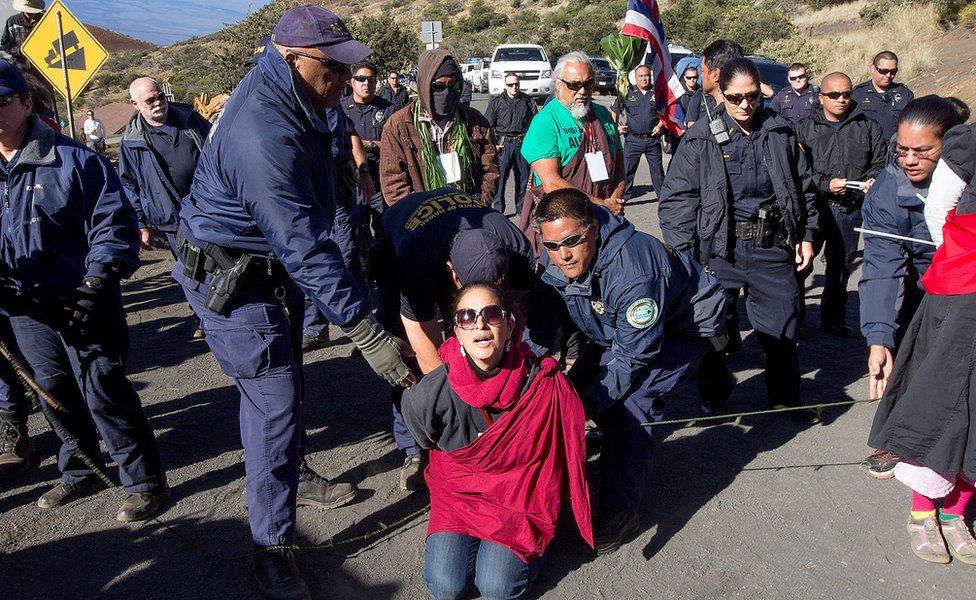
The desire for independence has grown since protests against the construction of a proposed telescope on Mauna Kea, a sacred site to Hawaiians
Despite Na'i Aupuni's reassurances, pro-independence Hawaiians feel that the 'aha is simply a vehicle to push federal recognition.
"People are acting out of fear," Managuil says. "Either route, I think, demands more time."
Apo has a clear preference, but whatever happens, he says, "at least it will be something that Hawaiians decided. Self-determination".
"I think if we're able to get to at least to the government-to-government relationship - the stage where we're actually negotiating - that would cap the 123 years with a good ending to the story and a great future for Hawaiians in being able to maintain their identity as a people," Apo says.
"If that doesn't happen this is never going to stop."